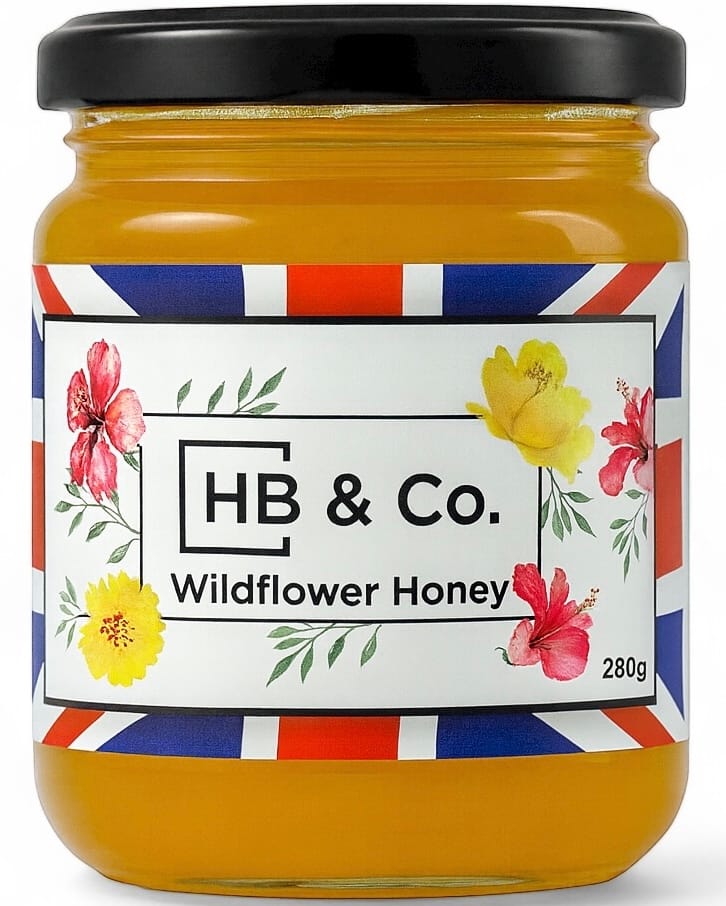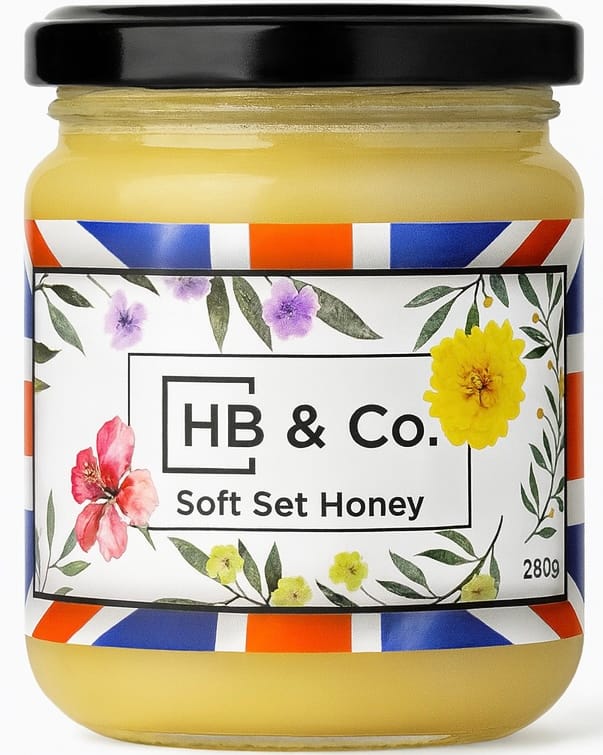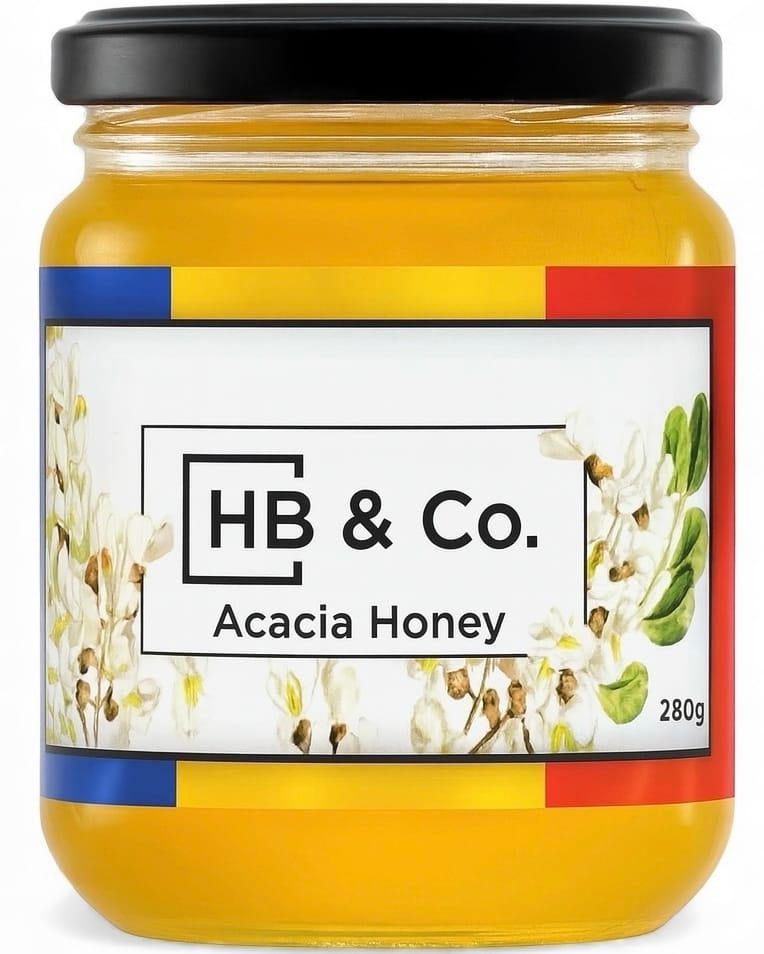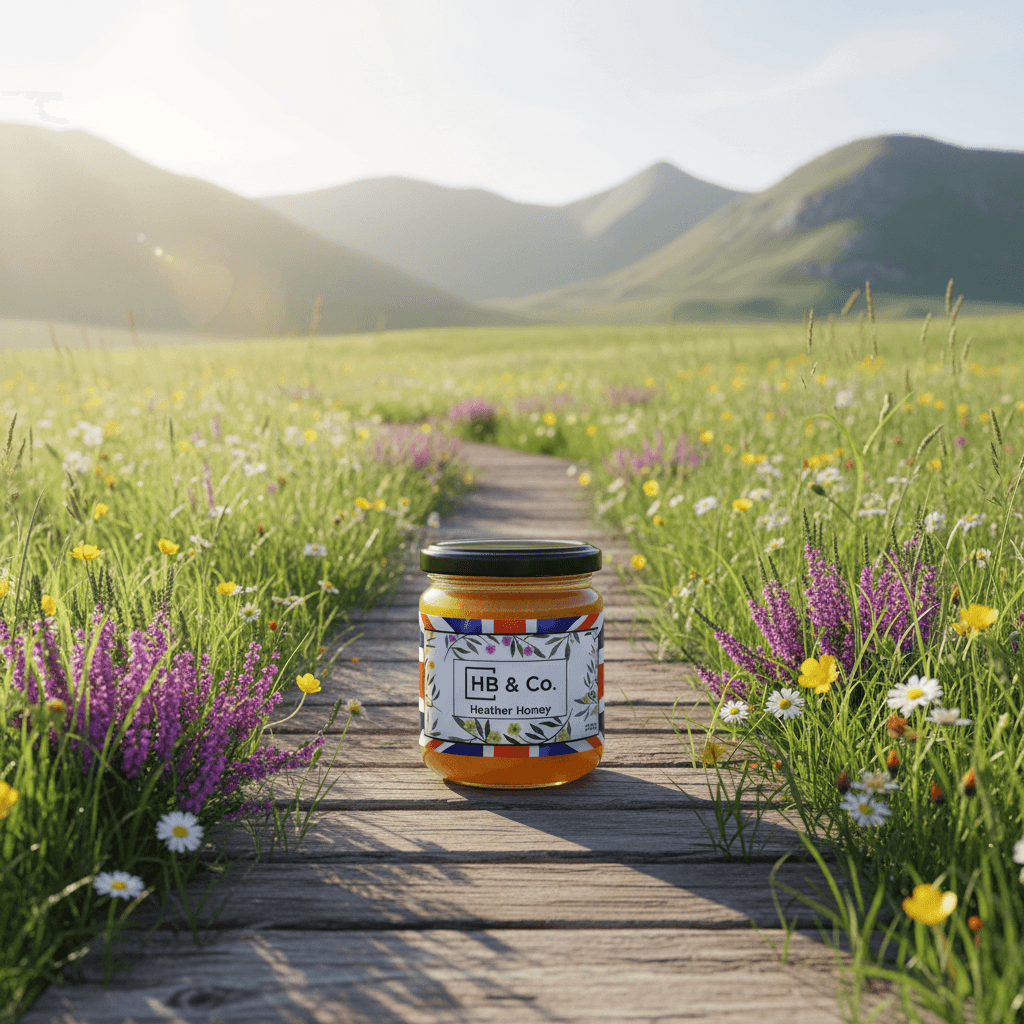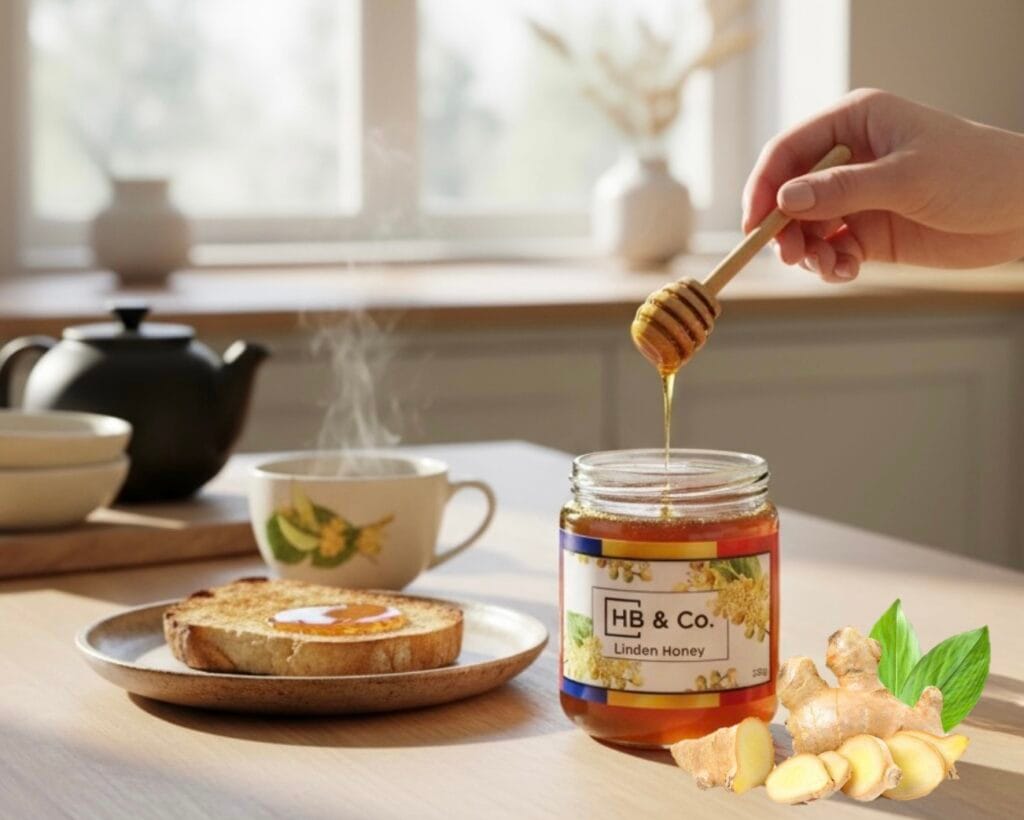Raw Honey - Just How Bees Made It
Discover 100% raw, natural honey sustainably harvested by generations of Beekeepers.

Welcome to HoneyBee & Co.
Our honey is gathered from the most beautiful and untouched places, such as the vibrant landscapes of the United Kingdom, including the Midlands, the Yorkshire Moorlands and also from the Transylvanian forests where we harvest our best seller and most precious product: Acacia Honey.
We are proud to introduce our new additions - Soft Set Honey and Wildflower Honey from the Midlands, and Heather Honey from the Yorkshire Moorlands. These are not just any honey, but unique, premium varieties harvested straight from the heart of Britain. They are local honey, gathered by small beekeepers with whom we work closely, helping them commercialize their honey and supporting the growth of the UK and bee population. From our family hives in Romania we now have also Limited Editions of Sunflower Honey perfect for toast & Linden Honey perfect for tea!
At HoneyBee & Co., we believe in preserving the natural goodness of honey. As a small, family-owned company, we are passionate about sustainable and eco-friendly practices. We are proud to be a sustainable company, and our commitment to the environment extends to every aspect of our operations, from the way we harvest our honey to the way we package it.
So come, and explore our world!
Why Choose our Raw Honey?
🍯 Raw & Natural, Just how bees made it!
🐝 Sustainably Harvest

✨ From hive to home, our honey is crafted with care, integrity, and respect. So when you choose HoneyBee & Co., you’re choosing more than honey. You’re choosing purity, sustainability, and craftsmanship in every spoonful.

We practise gentle, ethical beekeeping that puts the wellbeing of our bees first. Each batch is harvested in small quantities to protect the colonies and the surrounding ecosystem
♻️ Planet Friendly
🌿 Family Beekeeping Heritage & Trusted Partnerships

We package responsibly using recyclable glass jars and eco materials, because what’s good for the planet is good for the bees and we are very close to achieving 100% Plastic Free Status.

With six generations of beekeeping knowledge, our craft is rooted in tradition, respect, and passion for the hive. Alongside producing our own honey, we also work closely with trusted independent beekeepers who share our values. By supporting and helping them commercialise their harvests, we ensure that every jar of HoneyBee & Co. honey represents fair collaboration, ethical sourcing, and a thriving beekeeping community.
Raw Honey Subscription Box
SAVE 20% and have your favourite honeys delivered to you all year round!
SALSA Certification for our British Honey Supplier
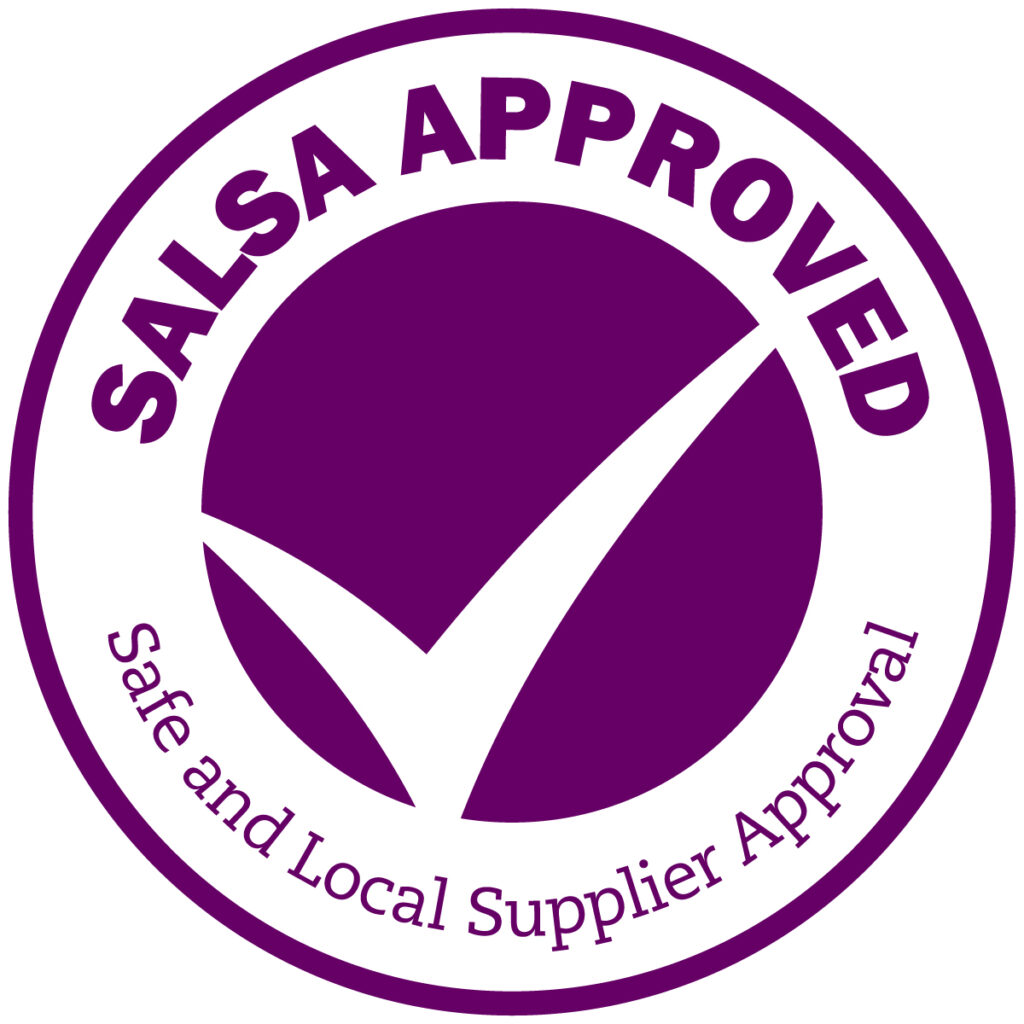
Our British honey supplier holds the prestigious Salsa Certification, a robust and effective food safety certification scheme tailored for smaller food producers and suppliers.
This certification attests that they adhere to industry-recognized standards that surpass the minimum requirements set by regulatory authorities.
To achieve SALSA approval, suppliers must demonstrate to auditors that they consistently produce and supply safe and legal food, and are committed to upholding the stringent SALSA standard. Founded as a non-profit venture by three major trade associations in the UK Food Chain, SALSA is overseen by the Institute of Food Science and Technology (IFST).
Their purpose is to offer affordable food safety assurance certification and support for small and micro businesses in the United Kingdom. Embodying values like prioritizing safe food practices, affordability, building supportive relationships, offering practical guidance, and promoting teamwork and collaboration, SALSA is instrumental in maintaining high-quality food safety standards in the industry.

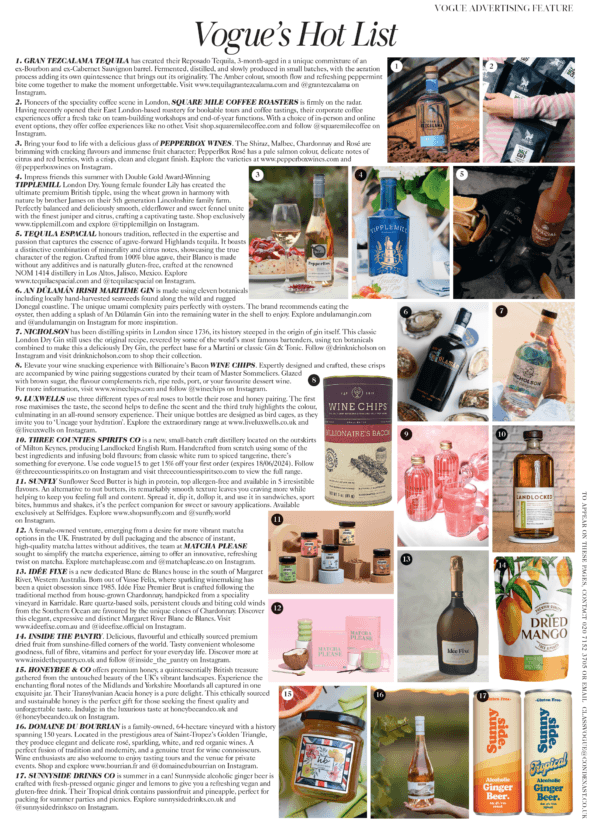
We are happy to be part of the Vogue Summer Hot List 2024 with our all-Natural Premium British Honey. Our dedication to crafting exquisite, sustainable products has taken us to new heights, and we couldn't be prouder! Find us in Vogue's June Edition and experience the flavours of nature's finest nectar on our website!
The Hive
Heather Plants: Complete Guide to Growing and Caring for Hardy Heathers
Few plants offer the year-round beauty and low-maintenance appeal of heather. These small evergreen shrubs captivate gardeners…
Ginger and Honey: Health Benefits and Easy Recipes
Curious about how ginger and honey can benefit your health? This combination can boost your immune system,…
Discover the Best Runny Honey for Your Pantry
Runny honey is a versatile and popular type of honey known for its smooth, liquid consistency. If…
Follow us on Social Media!
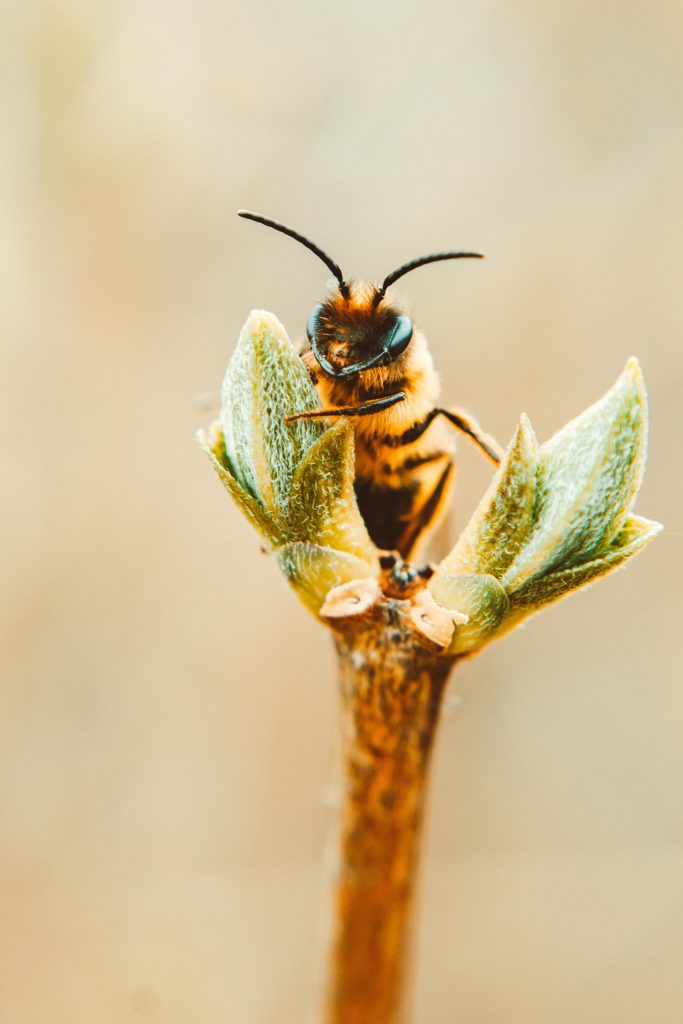
Our beekeeping story
At HoneyBee & Co., our story began with a deep respect for nature and a fascination with the gentle rhythm of the hive. For over six generations, our family has practiced traditional beekeeping learning to work with the bees, not against them. Every season teaches us patience, balance, and the importance of protecting the creatures that make life bloom. The hive produces not only honey, but also bee pollen, bee propolis, and beeswax. Each with unique nutritional, medicinal, and wellness properties. Bee saliva plays a crucial role in the creation of bee bread and other hive products, contributing to their nutritional and antimicrobial qualities. This dedication has shaped who we are: a small but passionate team driven by the belief that true honey should remain as pure and natural as the day it leaves the hive. Our family produces the Raw Acacia, Sunflower & Linden Honey varieties.
Today, we continue this legacy while partnering with trusted independent beekeepers across the UK and Europe who share our values. We help them bring their honey to market, supporting sustainable livelihoods and preserving artisanal methods. During minimal processing, only debris such as wax and dead bees are removed, ensuring that natural elements like pollen and beneficial compounds remain in every jar. Each jar we produce or source represents a shared promise raw, unpasteurised, and crafted with integrity. From hive to home, HoneyBee & Co. stands for authenticity, sustainability, and the timeless craft of real beekeeping. From the United Kingdom we supply the Heather, Wildflower and Soft Set Varieties of Raw Honey.
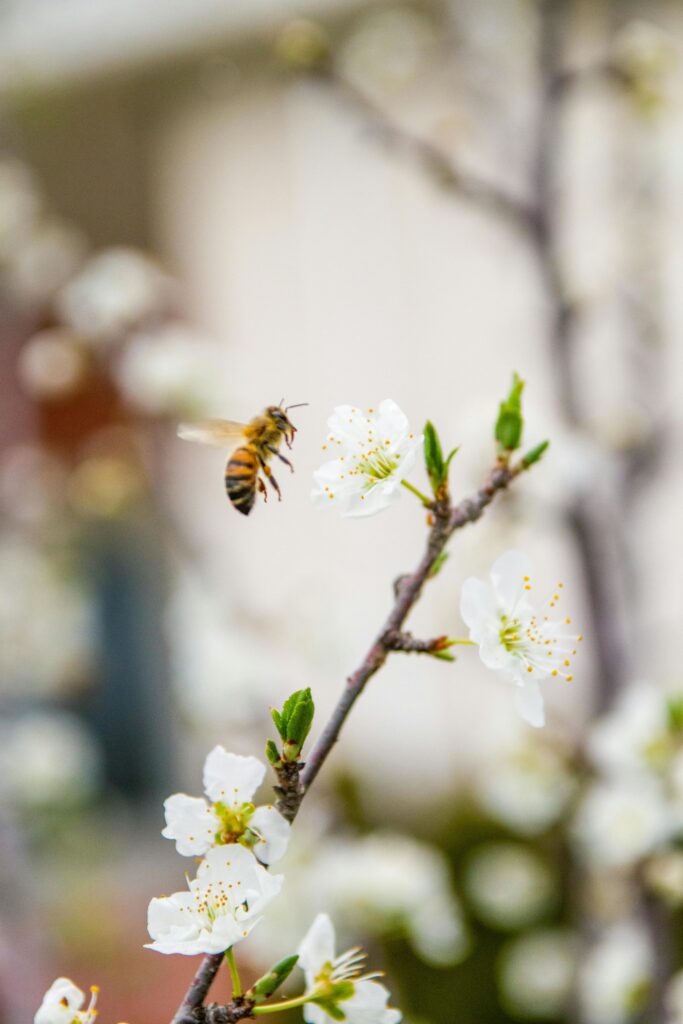
The Extraordinary World of Raw Honey and Honeybees
Raw honey, a natural sweetener produced by honey bees, has been cherished for centuries due to its distinct flavour and potential health benefits. Honey bees, remarkable social insects, create honey by collecting nectar from flowers and transforming it into this golden elixir. The flavour of raw honey varies based on the flowers the bees pollinate, whereas processed honey is often standardised for consistency. This article explores the intricate world of raw honey and honey bees, delving into their nutritional profile, production process, and ecological significance.
Raw honey contains natural sugars, vitamins, minerals, and antioxidant compounds such as flavonoids and phenolic acids(Ajibola et al., 2012). These antioxidants contribute to the antioxidant properties of raw honey, helping to reduce oxidative stress and protect the body's cells from damage. Raw honey also contains the following vitamins: B vitamins, vitamin C, and other micronutrients. Its nutrient and antioxidant content supports the body’s immune system and may help protect against chronic diseases. Pure raw honey is unprocessed and retains its full range of beneficial compounds, including enzymes and phytochemicals. Propolis, a bee product found in raw honey, is known for its medicinal and antioxidant properties. Glucose oxidase, an enzyme present in honey, contributes to its antibacterial effects by producing hydrogen peroxide. This nutrient-rich substance exhibits antimicrobial properties, inhibiting bacterial and fungal growth, and has been studied for its potential to help with stomach ulcers, particularly those caused by Helicobacter pylori(Mandal & Mandal, 2011). Additionally, honey aids in alleviating coughs, soothing sore throats, and relieving other symptoms of colds and flu. Consuming small amounts of honey containing pollen may help with immune adaptation and allergy relief. Honey can provide a natural energy boost and improve physical performance. Its culinary applications range from sweetening foods to enhancing marinades and sauces. In skincare, honey is used in face masks and as a natural remedy for minor burns.
Potential Health Benefits of Raw Honey
Raw honey is celebrated for its remarkable health benefits, thanks to its rich blend of antioxidants, vitamins, minerals, and beneficial compounds. Unlike processed honey, raw honey is minimally processed, preserving its natural enzymes and nutrients that contribute to its powerful antioxidant properties. These antioxidants help protect the body from oxidative stress, supporting human health and potentially reducing the risk of chronic diseases such as heart disease and certain cancers.
One of the standout benefits of raw honey is its antibacterial properties, which make it a trusted natural remedy for wound healing and soothing sore throats. The presence of beneficial compounds like glucose oxidase enhances its ability to fight bacteria and promote faster recovery. Because raw honey is unfiltered and retains its natural vitamins and minerals, it supports the immune system and encourages the development of healthy habits when included in a balanced diet.
Regular consumption of raw honey can help build healthy habits, offering a natural alternative to processed sugars and artificial sweeteners. Its delicious taste and versatility make it easy to incorporate into daily routines, whether drizzled over breakfast, stirred into tea, or used as a natural remedy for minor ailments. With its unique combination of health-promoting properties, raw honey stands out as a truly beneficial addition to any health-conscious lifestyle.
Types of Raw Honey
Raw honey is as diverse as the flowers honey bees visit, offering a spectrum of flavours, textures, and potential health benefits. Each type of raw honey brings its own unique character to the table, shaped by the nectar source, region, and the bees’ natural process. Here’s a closer look at some of the most popular varieties:
- Monofloral Honey: Crafted from the nectar of a single flower species, monofloral honeys, like lavender, eucalyptus, or orange blossom are prized for their distinctive flavours and aromas. These honeys capture the essence of their source flower, making them a favourite among those seeking a specific taste or the unique health benefits associated with certain plants.
- Polyfloral Honey (Wildflower Honey): Produced from the nectar of multiple flower species, polyfloral honey is often more robust and complex in flavour. This variety reflects the diversity of the local landscape and is a true celebration of nature’s bounty. Wildflower honey is a delicious, natural product that’s perfect for those who appreciate variety and depth in their sweeteners.
- Manuka Honey: Sourced from the Manuka tree in New Zealand, Manuka honey has gained a reputation for its powerful antibacterial properties and potential health benefits. It’s often chosen for its possible role in wound healing and supporting immune health, making it a staple in many health food stores.
- Acacia Honey: Known for its light colour and delicate, floral flavour, Acacia honey is a gentle option that’s easy on the palate. Sourced from the blossoms of the Acacia tree, this honey is often recommended for soothing sore throats and is a popular choice for those looking to build healthy habits with a minimally processed, organic honey.
- Buckwheat Honey: With its dark hue and bold, malty flavour, buckwheat honey stands out from the crowd. It’s rich in antioxidants and is believed to support immune function, making it a great addition to your health routine, especially during the colder months.
- Organic Wildflower, Forest, and Lavender Honey: These raw honey varieties, sourced from organic practices, offer unique flavours and health benefits. Organic wildflower honey celebrates the diversity of nature, organic forest honey provides a rich and earthy taste, and organic lavender honey delivers a soothing floral note.
The best honeys are often distinguished by their purity, high levels of natural enzymes, and ethical sourcing practices, ensuring you get a product that is both healthful and environmentally responsible.
When selecting your honey, consider not only the flavour but also the potential health benefits. Raw, unfiltered honey that is organic honey sourced from ethical beekeepers tends to retain more beneficial compounds like antioxidants and antibacterial properties than processed honey or pasteurised honey. Minimally processed honeys are more likely to deliver the natural nutrients and enzymes that nature intended.
In recent years, there’s been a surge of interest in the possible health benefits of raw honey, from supporting wound healing and brain health to acting as a promising brain booster. Comprehensive review and lab testing continue to highlight the excellent quality and beneficial properties of raw honey, making it a smart choice for those looking to build healthy habits and support overall well-being. Its antioxidant effects may contribute to enhanced brain health, offering potential cognitive benefits.
Whether you’re seeking a delicious addition to your tea, a natural remedy for sore throats, or a way to incorporate more antioxidants into your diet, there’s a raw honey variety to suit every taste and need. Raw honey can also be added to hot drinks as a natural alternative to sugar, providing a healthier and flavourful option. Explore the world of raw honey and discover the difference that quality, natural products can make in your daily life.
Bee Products and Pollen
Beyond honey itself, bees produce a variety of natural products that offer impressive health benefits. Bee pollen is a nutritional powerhouse, packed with vitamins, minerals, and antioxidants that can help boost the immune system and support overall health. Many people add bee pollen to smoothies or yogurt for an extra dose of nutrients and energy.
Propolis, another valuable bee product, is a resinous substance collected by bees from tree buds and used to protect the hive. It is renowned for its antimicrobial properties, making it effective in fighting infections and even supporting the healing of stomach ulcers. Propolis is often used in natural remedies and supplements for its ability to enhance the body’s defenses.
Beeswax, the natural wax produced by bees, is widely used in DIY and natural living applications, from homemade candles to skin balms. It is valued for its purity and gentle, protective qualities.
When combined with raw honey, these bee products create a powerful synergy, amplifying their individual health benefits. Together, they offer a holistic approach to wellness, supporting everything from immune health to skin care. Incorporating bee pollen, propolis, and beeswax into your routine, alongside raw honey, is a natural way to enjoy the full spectrum of what the hive has to offer.
Raw Honey
Raw honey contains natural sugars, vitamins, minerals, and antioxidants (Ajibola et al., 2012). This nutrient-rich substance exhibits antibacterial, anti-inflammatory, and wound-healing properties (Mandal & Mandal, 2011). Additionally, honey aids in alleviating coughs and promoting better sleep (Paul et al., 2007). Its culinary applications range from sweetening foods to enhancing marinades and sauces. In skincare, honey is used in face masks and as a natural remedy for minor burns.
Honey Bees
Honey bees live in complex colonies consisting of three castes: queens, drones, and workers . Nectar collection, honey production, and comb construction are collaborative efforts. Honey bees play a vital role in pollination, supporting biodiversity and agricultural productivity .
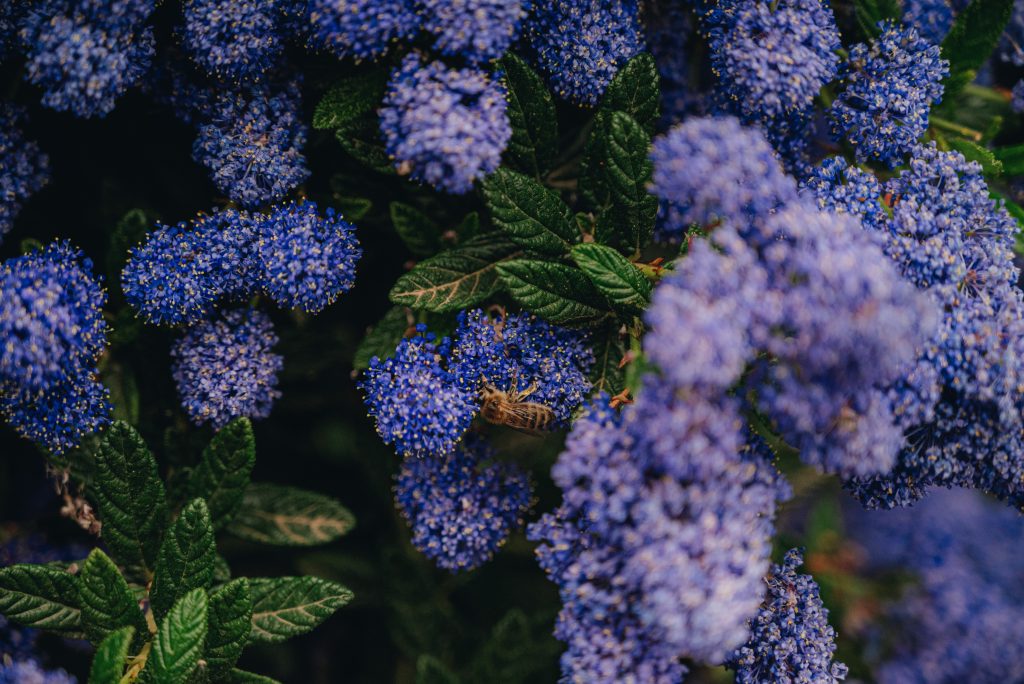
Sustainable Beekeeping and Raw Honey Production
Bee-friendly flora and organic farming methods support honey bee health . Sustainable beekeeping practices include proper hive management, responsible honey harvesting, and public education on bee conservation. Purchasing raw honey responsibly involves understanding honey grading, supporting local beekeepers, and considering ethical concerns.
Raw honey and honey bees exemplify the beauty and intricacy of the natural world. By making sustainable choices and supporting bee conservation, we can preserve this sweet partnership for future generations.
Natural honey is minimally processed, and free from additives, preservatives, and artificial flavours. It is extracted directly from the hive or honeycomb and retains its nutritional properties. Raw honey is not subjected to heat treatment, which helps preserve its natural enzymes and nutrients. Processed honey, on the other hand, is typically pasteurised to kill bacteria and prevent crystallisation. Pasteurisation of honey increases its shelf life but destroys many of its beneficial nutrients. Sourcing organic honey from small-scale beekeepers often ensures the natural quality of the product, making it a healthier alternative to processed sugars. Responsible beekeepers also avoid areas treated with pesticides to ensure the purity of their honey. Processed honey can contain high fructose corn syrup or other additives, while raw honey does not. Raw honey is generally produced by small-scale or organic beekeepers who prioritise ethical practices, while processed honey may come from large commercial suppliers with less sustainable practices.
Raw honey undergoes minimal processing, preserving its vitamins, enzymes, and antioxidants. It is extracted directly from the honeycomb and gently strained to remove debris. Raw honey may crystallise over time, resulting in a grainy texture while still being safe to consume. Crystallisation occurs naturally in raw honey over time, while processed honey remains liquid for longer periods due to intensive filtering and heating. It can be gently warmed to regain its liquid state. Processed honey is often clear and liquid due to intensive filtering, while raw honey can appear cloudy with visible particles. Regular honey is filtered and heated to slow down crystallisation, making it smoother and clearer.
Neither raw nor processed honey is safe for infants under one year of age due to the risk of infant botulism from Clostridium botulinum spores.
Comparison to Regular Honey
When it comes to choosing between raw honey and regular honey, the differences are significant. Regular honey is often pasteurised and heavily processed, which involves heat treatment that destroys many of the natural enzymes, antioxidants, and beneficial properties found in raw honey. This processing results in a product that may be smoother and clearer, but it lacks the excellent quality and health benefits of minimally processed, raw honey.
Raw honey, on the other hand, is typically sourced from organic and sustainable beekeeping practices, ensuring that it retains its natural nutrients and beneficial compounds. The absence of heat treatment means that raw honey preserves its full range of antioxidants, vitamins, and minerals, making it a superior choice for those seeking the best honey for their health.
In addition to its nutritional advantages, raw honey offers a unique flavour profile and a more authentic taste, reflecting the flowers and plants visited by the bees. Its natural, unprocessed state makes it a favourite among health-conscious consumers who value quality and the benefits of organic, natural products. When compared to regular honey, raw honey stands out for its purity, beneficial properties, and commitment to sustainable practices.
Customer Reviews and Testimonials
Our customers consistently share their enthusiasm for the health benefits and delicious taste of our raw honey and bee products. Many have found that incorporating raw honey into their daily routines has led to noticeable improvements in their overall health, from increased energy levels to better digestive health and a stronger immune system.
People love using our raw honey as a natural sweetener in tea, drizzling it over breakfast, or adding it to their favourite recipes for a touch of natural sweetness. The versatility and quality of our honey have made it a staple in many kitchens, with customers praising its rich, authentic flavour and the peace of mind that comes from choosing a minimally processed, natural product.
Testimonials often highlight the positive impact of our bee products, such as bee pollen and propolis, on their well-being. Whether it’s supporting healthy habits, soothing sore throats, or simply enjoying the delicious taste, our customers appreciate the benefits and quality that set our honey apart.
In summary, raw honey and bee products offer a wealth of health benefits and nutritional value, making them an outstanding choice for anyone seeking to improve their well-being naturally. The minimally processed nature of raw honey ensures that it retains its antioxidant-rich profile, antibacterial properties, and unique flavour, distinguishing it from regular honey. With its potential to support brain health, promote healthy habits, and act as a promising brain booster, raw honey is much more than just a sweetener; it’s a natural remedy and a testament to the power of nature.
By choosing raw honey and supporting sustainable beekeeping practices, you not only enjoy the delicious taste and health benefits of these natural products but also contribute to the preservation of the environment and the health of honey bees. Whether you’re looking to manage symptoms, build healthy habits, or simply savour the purest honey as nature intended, raw honey and bee products are an excellent addition to a healthy, balanced lifestyle.

Your Questions Answered
Carbohydrates, notably fructose and glucose, make up the majority of the sugar in honey, with lower amounts of other sugars, including sucrose and maltose. In addition, it has trace levels of minerals, vitamins, enzymes, and antioxidants. Furthermore, honey possesses a distinctive flavour and aroma due to its volatile organic compounds.
Although both nectar and honey are delicious compounds produced by plants and consumed by humans, their composition, sources, and applications differ greatly. The primary distinctions between nectar and honey are as follows:
Source: A sugar-rich liquid that plants, especially flowers, produce is called nectar. For pollinators like bees, butterflies, and hummingbirds, it provides energy. Bees, on the other hand, use the nectar they gather to make honey. Bees store the nectar in honeycombs after processing it in their stomachs, where enzymes, convert complicated carbohydrates into simpler ones.
The main ingredients of nectar are simple sugars such as sucrose, fructose, and glucose, as well as a little amount of vitamins, minerals, and amino acids. On the other hand, honey is a concentrated version of nectar that has been enhanced by the bees' addition of different enzymes and a higher percentage of simple sugars. Additionally, it contains minute amounts of wax, pollen, and other bee secretions.
Use: Bees use honey as a long-term food storage for their hive, while pollinators primarily use nectar as a food source.
Our Acacia Honey contains an Optimal water percentage between 15% and 19%. Cheap supermarket honey can have up to 50% water. This is due to either beekeeper feeding bees water with artificial sugar or they collect the honey to quickly to increase profit margins.
Honey is frequently seen as the healthier option when deciding between sugar and honey for a number of reasons, including:
Nutrient Content: Honey is a more nutrient-dense sweetener than sugar because, although both contain calories and carbohydrates, honey also has trace levels of vitamins, minerals, enzymes, and antioxidants.
Glycemic Index: When compared to sugar, honey has a lower GI. This implies a slower and longer-lasting release of energy from it as it is absorbed into the bloodstream. This may lessen the likelihood of blood sugar crashes and spikes, which are frequently brought on by sugar consumption.
Natural antibacterial qualities found in honey can aid in halting the growth of bacteria and other germs. Because of this, honey is a better option for healing wounds and may also provide some health advantages when ingested.
Taste and Variety: Depending on the flowers the bees visit, honey is available in a wide range of variations, each with a distinct flavour and colour. This variety can give meals a subdued depth of flavour and inspire greater culinary ingenuity.
Raw Honey is a product with many calories; approximately 320 kcal for 100g. Moderation is the key if one has a particular diet. The positive fact about honey is its sweetness. One teaspoon of honey weighs about 7gand its more than enough to sweeten your favourite cup of tea.
Raw Honey is safe and it provides many health benefits, nevertheless, it should not be cooked raw over 40 degrees. When cooked, honey becomes similar to glue and thus produces toxins. Honey's raw form is the one detaining all its main benefits and properties. By altering its chemical composition by heating or overheating the honey It may completely change its compounds leading to health hazards. Honey also contains bacteria that can harm a young baby’s intestine. To this end avoid giving honey to babies under 12 months old.
Acacia Honey Stimulates digestion cleans the liver, regulates intestinal transit. Improves heart activity and circulatory system. Helps to restore the body after effort. Stimulates the immune system. The number of red blood cells increases.
A honeycomb is a structure composed of beeswax, built by bees to store honey and serve as a nursery for developing bees.
A honeycomb is composed of a series of hexagonal cells, which bees form through wax production and using their bodies to mould the wax into shape. The cells are initially used to hold honey and then serve as brood cells to house developing bees in their various stages. Once the brood is ready to emerge, bees cap the cells with wax, allowing the honey to mature. Honeycombs are an intricate and fascinating component of a beehive, demonstrating bees' remarkable ability to build and organize their living and storage spaces.
The Hive
Interesting news, commentary, lifestyle, and all things Bees - have you got the buzz?

